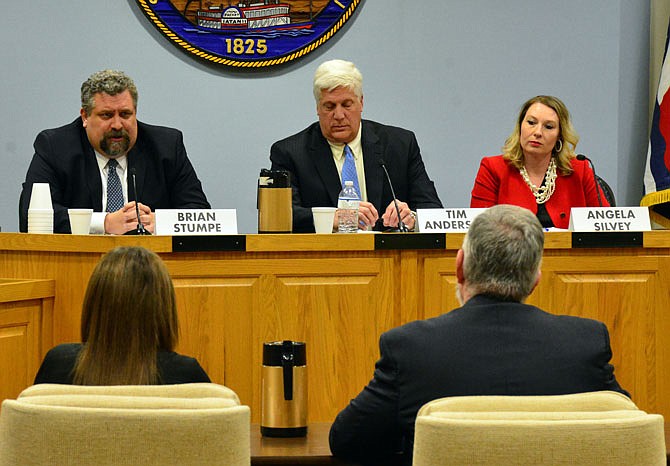Municipal court should utilize creative ways like community service to impose penalties for minor offenses on a case-by-case basis, the municipal judge candidates said Tuesday during News Tribune's candidate forum.
Instead of imposing fines or jail time, candidate Brian Stumpe said, he has used alternative ways to penalize minor offenses, depending on the case. For example, he added, if a teenager receives a speeding ticket, many times the parents pay the ticket, and the insurance goes up.
"We defer them into a program where they do one hour of community service for every mile they were speeding," he said. "That keeps the points off their license, keeps the insurance down, and makes that person take responsibility for their actions."
He added municipal court has other programs that encourage defendants to go back to school, receive alcohol and drug counseling, or wash police vehicles. The court also has some volunteers who act as mentors to defendants.
Candidate Angela Silvey agreed community service is one way the municipal judge could impose penalties for minor offenses. She added there are ways the municipal court could expand that, such as partnering with smaller nonprofits and seeing how defendants could help those organizations.
"If they did that, they would realize how wonderful this community is and go, 'You know what, I don't want to do things that's cost city money because I want it to be where I'm giving back to the community, not taking away,'" Silvey said.
Candidate Tim Anderson said imposing alternative penalties is a way for the city to get creative. He said he became interested in a program called Justice Fellowship, which encouraged victims and defendants to meet and ask questions.
"They talked with victims of crime and they asked, 'What would you like to get out of what happened here?'" Anderson said. "More often, a victim would say, 'I would like to sit down across the table from the person who violated me in whatever shape or form and ask them questions - why did you choose my house to steal my TV? Why did you choose me to assault?'"
He said this would be helpful to both parties and could deter crime.
To help deter some minor offenses, Stumpe said, he suggested partnering with the local high schools and Lincoln University and having the municipal judge and city prosecutor speak with the students. They could answer students' questions and have one-on-one conversations.
"(We could) go in and talk to the students about things that could mess you up in life," Stumpe said. "Things that don't seem that bad in life at 17 years old or 21 years old but really aren't that good when you look back on the long-run."
Silvey said the municipal judge should not only work with LU and Preferred Family Health, but also police and firefighters. She warned if they do work with certain groups, the city would have to ensure it will not create liability issues.
"If we do a mental health court, you're talking about people's medical issues, and we can't just have anyone handling those issues," she said. "We're also talking about people who have committed crimes so you don't want to pair someone who committed a violent crime with a student."
Anderson suggested partnering with churches and making the community aware of the needs in the community. As an example, he said, if students steal clothes from a store because their home does not have heat, churches could help those individuals and deter the individuals from committing crimes.
"We have so many churches, so many bodies of Christ that would love to know that there is a need and could meet those needs proactively," he said. "It doesn't necessarily have to be after an offense but could be before that where we let the churches know and community groups know these are the possible needs."
Jefferson City residents will vote for the municipal judge on April 2.
Watch the Video: Jefferson City Municipal Judge Candidate Forum

